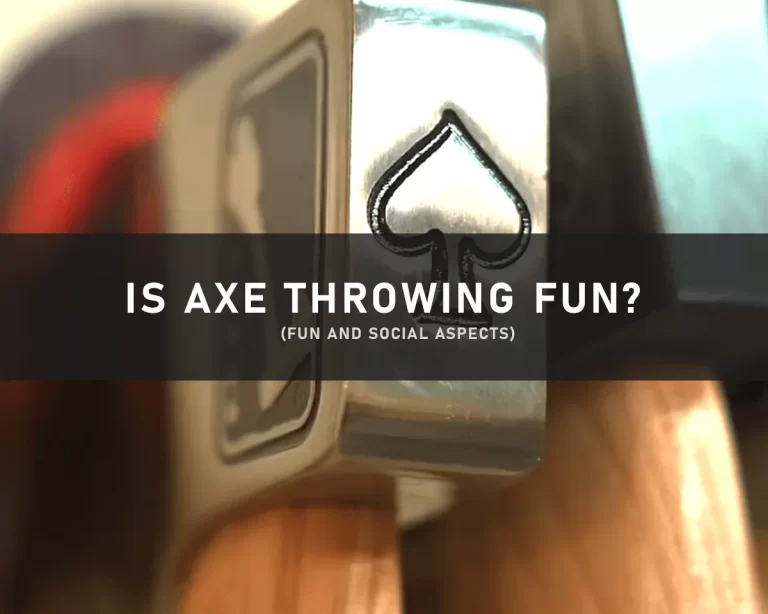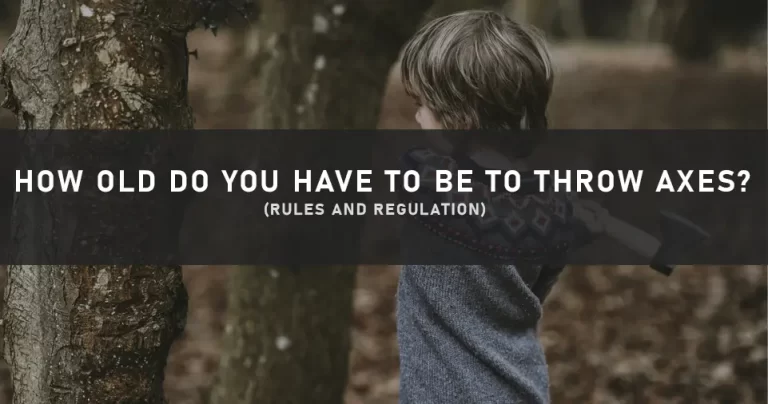Axe Throwing Terms Decoded: Your Comprehensive Guide
Being invited to an axe throwing game for the first time, but you don’t want to sound like a noob? Going to something you don’t know might make you feel less confident. No one wants to sound unsure, so researching the matter is always best. It gives you a certain code of conduct with a surge of confidence.
All games have their terminologies and dedicated terms unknown to beginners. The same goes for axe throwing. There are associated axe throwing terms like bullseye, blue ball, doubles, kill shot, etc. Learning the specific terms will give you more than half of an idea of how to play it.
This article will teach you all the associated terms with axe throwing equipment, game, leagues, and abbreviated terms.
Axe Throwing General Terms
There are broad axe throwing terms that everyone should know. It doesn’t matter if you want to play it; these terms will help you learn more about axe throwing.
- Bullseye: As from the name, it depicts something like a target. It is a targeted red point in the center of the wooden board on which the player must hit to collect the highest points.
- Target: The target is the term used for the whole wooden board on which the participant throws the axe. It has concentric circles drawn; each circle has an associated point value.
- Blue Balls: Two blue circles are on the top of the target, used for playing with double axes. Each has a 10-point value; they are considered active during sudden death.
- Rotation: the number of times your axe spin covering the distance between your point of throw and the target is considered rotation. The number of rotations depends on the player’s skill and style of throw.
- Follow-Through: The motion of the thrower’s arm and body after releasing the axe; the smoother the follow-through, the more chance there is not to miss the bullseye.
- Over-Hand Throw A technique where the player throws an axe over the shoulder; it is often done with a single rotation to reach the target.
- Underhand Throw: A technique in which the player throws axes in underhand style with the blade facing upwards; it also goes with single rotation in most cases.
- Knockout: The situation where one player wins the game against another with a margin, and there is no way the other player can make it one remaining throw.
Axe Throwing Venue Terms
Like other playing fields, axe-throwing venues have specialized sign boards and displayed posters. They all have names and certain meanings; let’s check terms associated with axe-throwing venues.
1. Lane
A designated straight line is designed for the player to stand and throw the axe. They provide a certain distance for players ensuring the safety protocol for taking a shot.
2. Backstop
A protective barrier or netting behind the target area to stop or catch the axes missing the spot. It ensures that missed axes don’t further compromise the safety of others.
3. Pit
The term used for the areas where axe throwing occurs is often used interchangeably with the lane. Lane and pit serve the same purpose. Opponents use this term and avoid going into one another’s hole.
4. Safety Line
The safety line is the marking on the floor which gives an idea of the safe distance from where the player can throw the axe. The specific distance helps in taking a better shot and hitting the target.
Axe Throwing Game Terms
Aside from the venue, regular axe-throwing players use certain terms while playing the game. Here are some of the axe-throwing game-related terms that everyone must know.
1. 01 Game
It is a game format inspired by darts, where players start with a specific point value (e.g., 501 or 701) and must reach zero by subtracting the score point from their total with each throw. The player who reaches zero first win the game.
2. Round Robin
A game format where participants rotate through multiple lanes or targets. They compete with each other to gather the points and try to accumulate the highest score.
3. Battle Axe
It is a competitive term used for axe-throwing battlegrounds where two players or teams face each other, aiming to outscore their opponent in each round.
4. Iron Man
A game format where participants throw a fixed number of axes consecutively without breaks or taking turns, testing endurance and consistency. The player who gathers the maximum points within the designated number of throws wins.
Axe Throwing Abbreviation
Like cricket, basketball, and tennis, axe throwing has some specified abbreviations. Abbreviations are the language of pro players and depict how old you are in that game.
1. ATA
ATA stands for “Axe Throwing Association.” An organization that promotes and regulates the sport of axe throwing. They are often known as clubs that promote certain leagues or organize completions.
2. BYOB
BYOB stands for the term “Bring Your Beverage”. Some axe-throwing venues that do not offer services like eatables or beverages allow participants to bring their drinks. It can be both alcoholic or non-alcoholic; however, it is checked before entering.
3. BYOA
BYOA is an abbreviation of the term “Bring Your Axe.” It means the venue demands participants to bring their axes depending on their skills and playing style.
4. WATL
WATL stands for the term “World Axe Throwing League.” A global organization that organizes axe-throwing events a maintains standardized rules and regulations. It also helps in making axe throwing a worldwide phenomenon.
Conclusion
By now, you know all the axe throwing terms necessary to make you an expert in the axe-throwing game. Step into the axe-throwing venue with confidence and all the knowledge that makes you sound like a pro. Also, you can invite your friends to the axe-throwing game for the next meetup and show off your newly learned skills to make an impression.
So, are you ready to make an axe-ceptional entry? Let me know if this information is helpful to increase your axe-pertise in the game.







